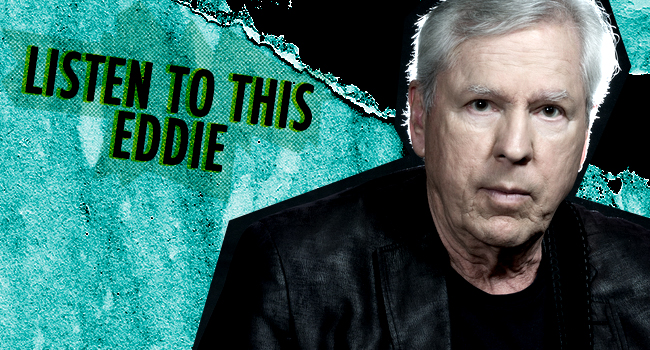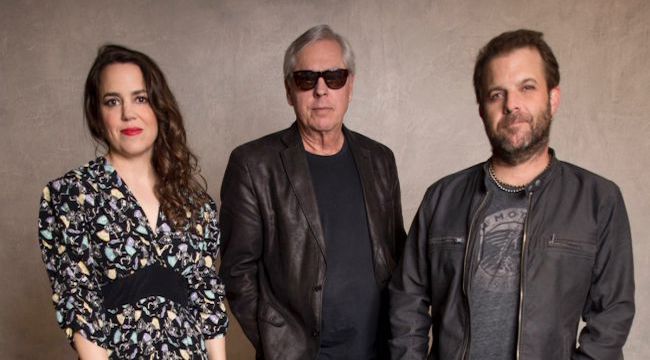
Listen To This Eddie is a weekly column that examines the important people and events in the classic rock canon and how they continue to impact the world of popular music.
Shortly after the death of drummer Scott Asheton in 2014, the writing was pretty much on the wall for the legendary proto-punk band The Stooges. Led by enigmatic frontman Iggy Pop, the band had enjoyed a late-career victory lap so-to-speak throughout most of the ’00s, releasing a couple of albums and touring extensively. Now, with only Ig and Raw Power-era guitarist James Williamson left as the two living members of the group, it didn’t seem to make sense to carry on any further.
“Iggy and I were the only ones left and after 10 years together we were kinda over each other,” he said. “It didn’t stop me from wanting to make music.” And so he did. In 2014, Williamson put out an album called Re-Licked, re-purposing material that he’d demoed back in the mid-70s, using a variety of guest vocalists. And now, four years later, he’s back again with a completely new band called The Pink Hearts, for a wildly eclectic album titled Behind The Shade, set to drop next month on June 22.
I recently had the chance to speak with Williamson about his time in the Stooges, his frank, unflattering view of David Bowie, and how he continues to push his music forward with a pair of stellar new collaborators.
How did this new solo album of yours come together?
It was a little bit of serendipity. About this time last year, I started writing some new music. I didn’t have anything in mind for it, just wanted to do it. Along the way, I figured out I wasn’t any good at writing lyrics, so I decided I’m gonna go look for somebody that can do that and write some songs. Frank Meyer was a recommendation from Cheetah Chrome’s and I was pretty impressed with his vocals and his stage presence and so-forth, so I gave him a call to see if he could write lyrics and it turns out he could. He could really write lyrics. He could write them fast too. Then, of course, I thought of Petra Hayden who I worked with on a number of different things. I tried to put her together with Frank and it turned out that vocal blend was like magic. So we just went on from there.
The last time the Stooges ended in the ’70s, you went into a long hiatus and entered the tech world. Did the idea enter your head that you might not continue with music after this more recent end of that band?
Yeah. I had gotten back into it, I guess, so I felt like I had more music in me. I did several singles and then we did Acoustic K.O., but then I wanted to write some new music, so that’s what this is.
How freeing was it for you to write songs outside of the Stooges framework?
Oh yeah, I loved it. The thing about these singers is that they have such a wide range [of music] that they’re capable of. It really did bring me up quite a bit to explore different styles and different nuances within the music because they could handle anything I could throw at them. It’s a pretty diverse album.
How do you work creatively as a songwriter?
It works the same as it’s always worked with me, which is that I come up with some music, the riffs basically, and keep playing them. If I can stand them for a couple weeks myself, I’ll try ’em out on Frank. He would just turn them around, sometimes overnight, or at least within a few days, and from there, if we needed something else like a bridge or a chorus, then we would develop it. Essentially, it always starts with the music, and that’s the way I always wrote with Iggy. It’s the only way I know how to write. If you give me lyrics, I can’t write music to it, but if I give you a riff and you can write music to it, we’re on our way.
Did you change your guitar rig at all from your time working with the Stooges to now in this new band?
I pretty much do the same thing. Especially for the uptempo stuff I use my regular rig. I have a 1965 Vox AC30 Twin, which has a head and a cabinet, and of course the Les Paul Custom guitar. That’s kind of my sound and I use on almost everything, but I did try some different things. I used a Telecaster on a couple things. There’s also a fair amount of acoustic on there, but that’s not new to me. I used acoustic even on Raw Power. On one of the tracks I used my first amp ever, which was a Silvertone 1481. My old guitar player in my first band The Chosen Few, Richard Simpson, I was in touch with him and back in the day I traded him that amp for a pair of boots. I think he got the better of that deal. But it was just sitting in his basement for all these years, and we got in touch and he said, ‘I’m not playing guitar and that thing is just sitting down there, do you want it?’ And I said, ‘Hell yeah! Send it back!’
Can you describe what that was like playing with Iggy and The Stooges at the end of that last run?
It seems really glamorous to be in a band at that level where it’s pretty cushy — hotels and flights and all that stuff — but the reality of it is, you’re just like a jukebox. We weren’t playing any new music really. We played a few of the tunes from Ready To Die, but Iggy just wasn’t into it. He was into “No Fun,” and “I Wanna Be Your Dog,” and “Search And Destroy” and all the ones the crowd recognizes. Sure, that’s probably a good entertainment thing to do, but after you’ve done that for a few years, it just gets old.
Are you still cool with Iggy?
I don’t know. We haven’t talked to each other for quite a while. We do this periodically. Our relationship is more about the band, and since there isn’t a band anymore, there nothing for us to [talk about]. We’re quite different people actually from each other, but in terms of writing and stuff, we always had the ability to do that pretty prolifically.
Another individual you worked with back in the day was David Bowie, who has since passed. I’m curious to know what you’re impressions were of him during that Raw Power period in the ’70s?
Most of my interactions with him were very early on when we first went to London. He was with the same management group, so we would see him in the offices. I went over to his house with Iggy a couple of times and there were various interactions over the years, but not all that much. He got very busy becoming a pop star and we got very busy trying to destroy our lives [laughs]. We weren’t on the same trajectory is how you’d put it. Once the Raw Power Stooges had run its course, the only other time I ran into him was when I was producing the album Soldier for Iggy. He came to the studio and stuff and it wasn’t a very pleasant time for me, but I guess my impressions of him are that he was a very smart guy, certainly a talented musician, kind of an asshole on a personal level, but that’s neither here nor there. That doesn’t take away from his talent.
When you think back on your time in the Stooges, are there any gigs that stand out in your mind as being especially memorable?
My memories of the ancient past are much clearer because there weren’t as many gigs. Oh God, you know the shows that were recorded like Metallic K.O., that was a memory that was seared into my brain because of the absolute danger involved. Certainly, the performance leading up to that one at a small club outside of Detroit called the Rock And Roll Farm, where Iggy got punched out. It was a biker bar, and we didn’t get paid and almost got killed; that was pretty memorable. Then there are the first shows [in 1973] in Atlanta in Richard’s Place, which is the one where Elton John showed up in a gorilla suit. Those were memorable gigs.
When it comes to this new album, what songs are you most excited to sink your teeth into and present to the people?
Well, we’re gonna play them all. I’m actually looking forward to playing the entire album. The material is great and the thing is that, this group of people can actually bring these songs and deliver them the way they were recorded. These guys are that good. Even if you don’t like things when you first hear them, they’ll grow on you. It’s that kind of record.







